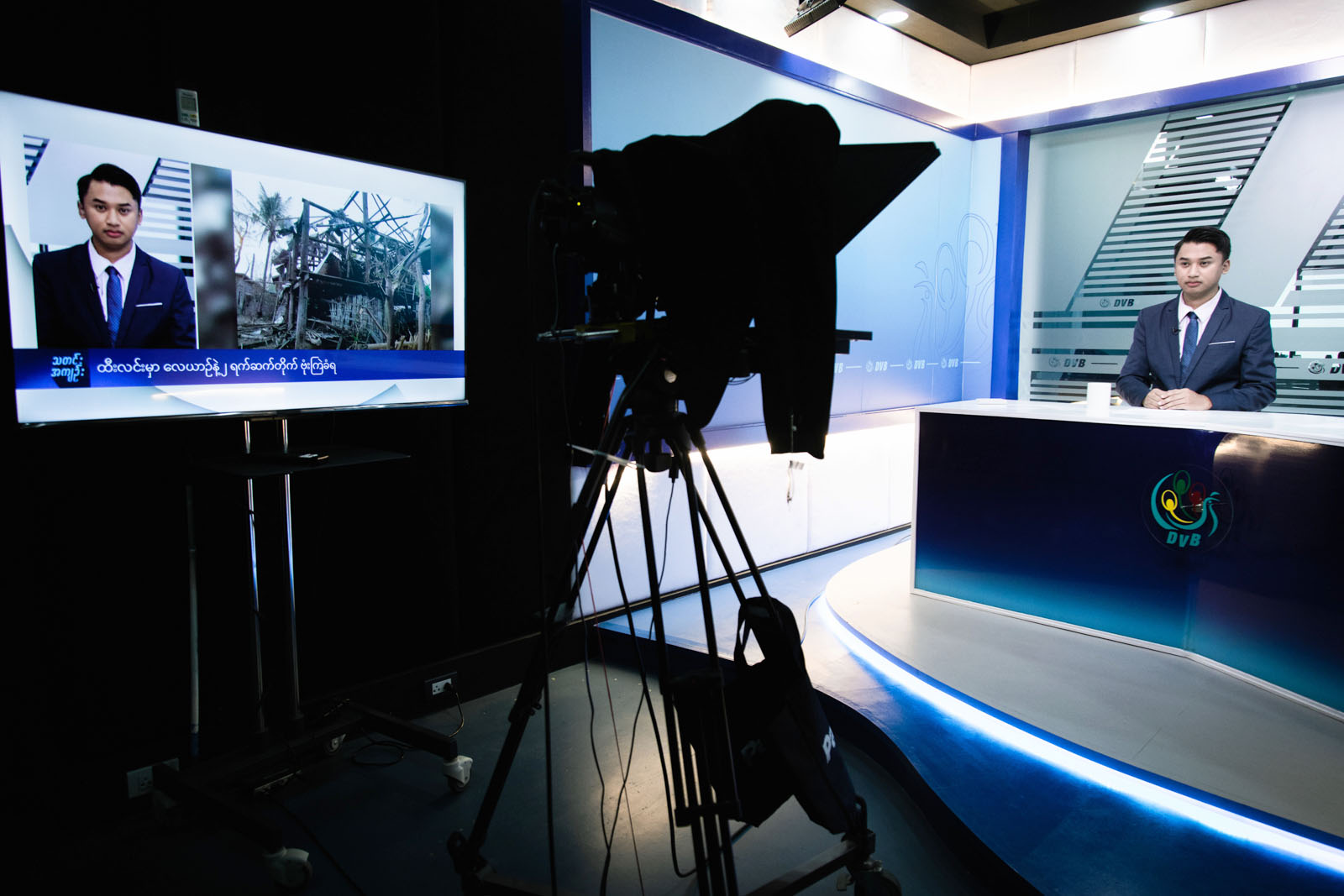Thu had been teaching physics at a high school for three years when a military coup deposed Myanmar’s government in February 2021. Incensed by the putsch, he joined a nationwide strike and protests organised by the Civil Disobedience Movement – and was soon slapped with an arrest warrant for his defiance.
Now a wanted man, Thu fled over the border to Thailand, set aside his past as a teaching professional, and took up a new job as a journalist with a media agency operating in exile from the kingdom. The teacher-turned-journalist, who used a pseudonym in the interview to protect his identity, cited the desire to keep the world informed of the human rights situations in Myanmar as his motivation for his entry to the field of journalism.
“If these media outlets are gone, the international community will not be able to properly see what is happening in Myanmar,” Thu told HaRDstories. “It is the job of journalists to record the war crimes committed by the junta.”
With at least 43 media workers behind bars, per a 2023 report compiled by the Committee to Protect Journalists, Myanmar has emerged from the coup as one of the most hostile places for the press, where independent journalism remains stifled by threats of legal actions and state violence. The International Federation of Journalists also noted that four media workers have been killed on duty since the military takeover, and 176 more have been arrested or apprehended.
The plunge in press freedom has led to an exodus of journalists and media workers to set up shop in the neighbouring Thailand and report on Myanmar from across the border – an arrangement that reminds many of the aftermath of the bloody crackdown in 1988. Some, like Thu, also left their old jobs and took up journalism in the hope of carrying the voice of their compatriots to the global audience.
But even in the relative safety of Thailand, these media workers still face immense challenges in their careers, such as the struggles to adjust to a foreign environment, threats of arrests and deportation, as well as the lack of legal protection, sustainable income, and support for their mental or physical wellbeing.
“The job of a reporter is like a moth in the middle of dangers,” Thu said. “I knew it was a fire, but I had to go in there, not for myself, but for the good of my country in the future. It’s worth taking the risk of the sake of my future children.”
Broken dreams
Thu now works for a news outlet called Dawei Watch, which publishes news stories and videos about the ongoing civil war and other happenings in Myanmar. Much of his work involves maintaining contacts in Myanmar, interviewing eyewitnesses on the ground, and verifying reports of fighting or attacks by the junta forces.
It is a far cry from his past as a highschool teacher, a relatively stable job back home. Thu had no prior experience in the media and the job doesn’t exactly come with a big paycheck, but he still considered himself lucky compared to many other exiles.
“I heard that some of my friends and colleagues are now working as factory workers, construction workers, and even fishermen,” Thu said.
Another news outlet operating in exile from Thailand is Delta News Agency, or DNA, whose newsroom is headquartered inside a suburban residential building. The agency employs 18 people to keep a close watch over the crisis unfolding in Myanmar; the news team also includes some journalists who remain in Myanmar or report from the borderland.
Hsu Mon founded the outlet back in 2018, driven by her dream to see her country endowed with an independent, locally run press agency as in other pledging democracies. Her other dream was starting a family with her partner, who also worked as a journalist at the time.
Those dreams were shattered by the junta’s ascendancy in February 2021. The authorities issued arrest warrants for Hsu Mon and closed down her newsroom, forcing her and her team onto a flight for their safety in a territory controlled by the Karen militia. They eventually made their way into Thailand, regrouped, and continued their work from their makeshift newsroom.
It was during her exile that Hsu Mon suffered from a miscarriage, after a series of difficult journeys through Myanmar and Thailand’s border area. She recalled having pain due to the miscarriage when she arrived in Thailand, and so decided to see a doctor at a hospital in Tak province, but the journalist said the level of care given to her was rudimentary.
“The doctor just gave me painkillers and told me to come back again another day,” Hsu Mon said.
Papers, please
As the newsroom leader, Hsu Mon said she’s always felt the weight of responsibility for the wellbeing of her journalists who took great risk in reporting from Myanmar and the border region. At the same time, the life in exile makes her ever worried about being arrested or sent back to Myanmar, due to her lack of documentation.
“I’m anxious every time I go outside,” she said. “I was stopped by the police for a paperwork check twice, and both times I had to pay them in exchange for my release.”
The absence of a convenient route to proper visas and immigration status is an issue that many Myanmar media professionals brought up in their interviews. Although Thailand has no law that requires domestic journalists to possess any kind of professional licence or permit, the situation is different for foreign media workers.
Per regulations by the Ministry of Foreign Affairs, foreigners wishing to work as correspondents in Thailand must qualify for a number of criteria that many exiled journalists say they cannot realistically hope to meet. For a start, they must show proof of employment with “a credible media entity duly registered with the competent authority in Thailand or abroad,” along with a record of producing at least twelve news pieces about Thailand in the past year.
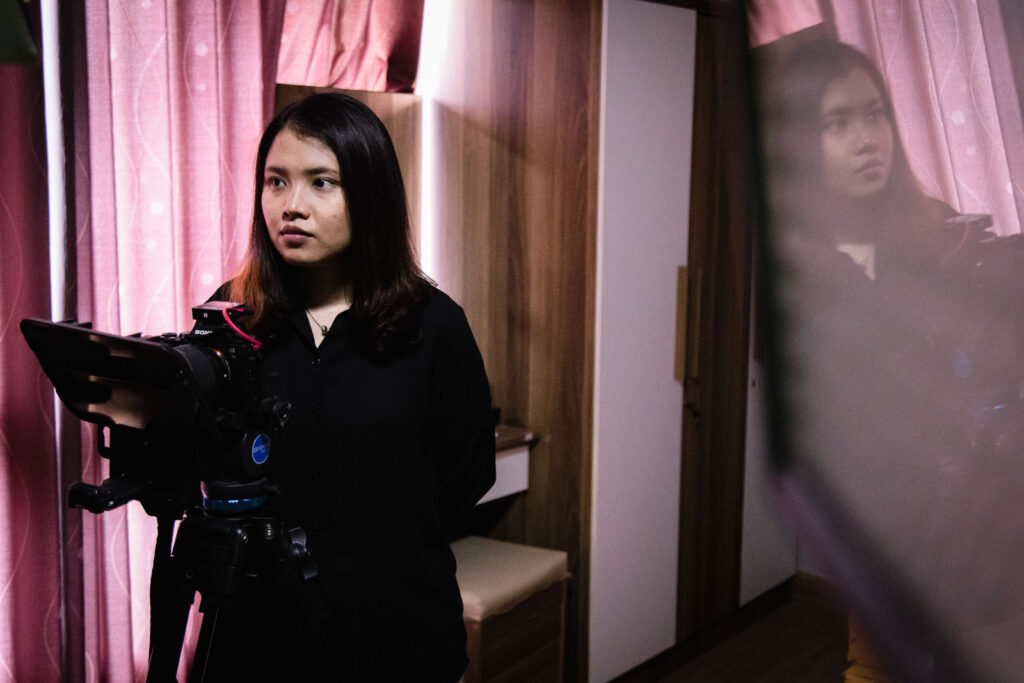
Applicants also cannot have any outstanding “arrest warrant issued by a foreign government” – which would effectively bar exiles like Hsu Mon and Thu. Other journalists also lack basic paperwork that would allow them to start a visa application process in the first place, since they fled to Thailand without documentation.
Due to these restrictions, many media workers living in exile vary greatly in their visa statuses. Some possess permits that allow them to work as migrant workers (such as Thu from Dawei Watch), others work in journalism under the pretence of student visas, while a number of them have no legal status in Thailand at all.
As a result, these journalists are forced to hide their identity and keep a low profile out of genuine fears of legal prosecution, whether for entering the kingdom illegally or working in the media without proper visas.
“How long do I have to live here in Thailand until I am allowed to live my life legally?” Thu wondered aloud.
The news you can trust
Reporting stories about Myanmar from the outside, and making sure that those stories are factual and correct, is a wholly different category of challenge for the journalists in exile.
Hsu Mon said even making contacts with local residents is a struggle for her team, due to the restrictions on internet access imposed by the authorities in Myanmar. Only major cities like Yangon, Mandalay and Naypyidaw have reliable – though limited – internet connections, she said, while many residents, fearful of retaliation by security forces, avoid talking to journalists altogether. All of these circumstances mean verifying reports and sifting through rumours of wars is a painstaking effort.
“To produce just one news item takes such a long time, because we have to contact our sources and verify the information,” she explained. “And to be a journalist inside Myanmar has many risks. That’s why many journalists in Myanmar have decided to quit their jobs.”
The DNA founder also lamented the rapid decline in the number of Myanmar media outlets, spurred by mass flights of journalists and newsmakers to other countries and the collapse of viable business models brought about by the civil war. As advertising revenues and other usual sources of incomes dried up, existing media agencies have to vie for a limited pool of grants and potential donations to keep themselves afloat.
One of the attempts to unite the fragmented community of exiled media in Thailand and seek a collective action is the formation of the Independent Press Council of Myanmar, or IPCM. The council, which doubles as a press freedom advocacy group and a self-regulating body, presents itself as a credible alternative to its official counterpart back home – the Myanmar Press Council – which has been effectively dominated by pro-junta figures.
The independent press council currently counts at least 38 media outlets as its members, according to its secretary general Toe Zaw Latt, who said the group’s main mission is to ensure the safety of Myanmar journalists and support independent news agencies in exile.
Speaking of the dire financial circumstances faced by many such news outlets, Toe Zaw Latt said foreign donors and grants seems to be the only source of funding for the media in exile. But such a solution may also threaten the impartiality and independence of these struggling media entities, he warned.
“We don’t have revenues from advertising anymore, so we have to rely on foreign donations, and that’s very dangerous,” Toe Zaw Latt said.
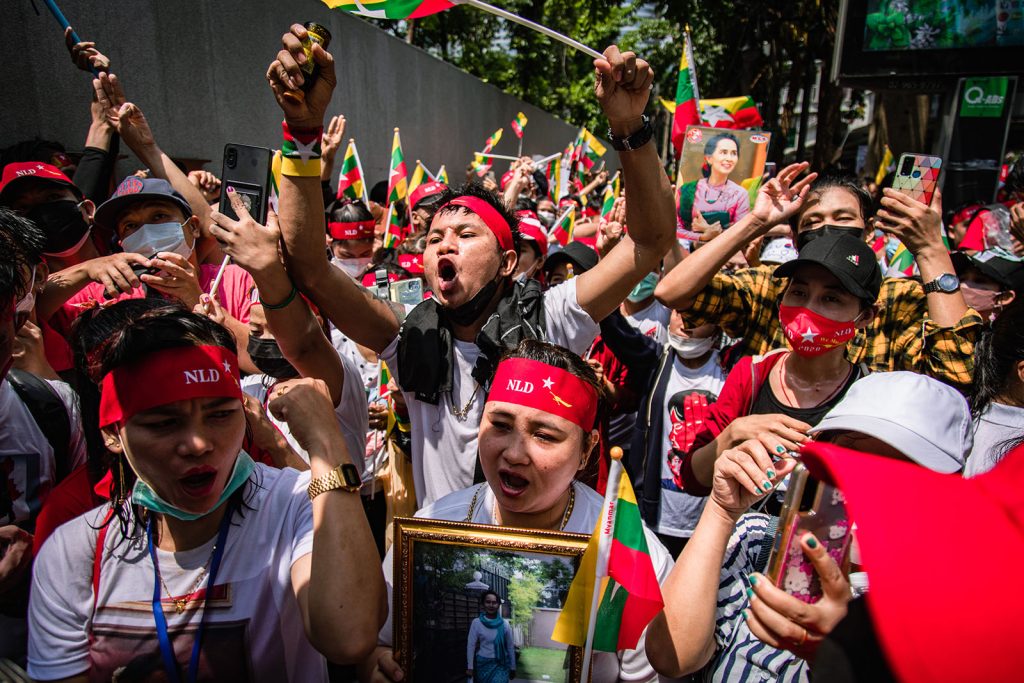
Despite the bleak outlook, many Myanmar media workers are determined to keep doing their jobs and passing on the news from inside their country to the wider audience, since they see journalism as one of the last remaining tools to expose the atrocities committed by the junta regime against its own people, the IPCM secretary-general said.
“Democracy will disappear once there’s no independent press, because that would mean no one can tell you the truth,” he said, noting that Myanmar’s press freedom ranking in 2020 was even higher than Thailand’s, only to take a dive under the current military rule.
Hsu Mon cited a similar motivation behind DNA newsroom’s round-the-clock effort to churn out videos, interviews and articles about the reality inside Myanmar.
“We want international support,” she said. “Information is very important to our country at this moment. The public needs facts to decide how to live, but without an independent press, the people of Myanmar won’t be able to make those informed decisions.”
From 1988 to 2021
Before the coup in 2021, Bo Thet Htun was a film director who followed his passion of telling the stories about Myanmar through the art of cinema. Now he’s working as a producer for the news outlet Democratic Voice of Burma, or DVB, from a small house that he shares with his wife in Thailand. He hopes the arrangement is temporary, until he manages to save enough, go back to Myanmar and pick up his career in professional filmmaking.
“I will produce as many documentaries and films as possible, and then I’ll be a film director once again,” Bo said. “If I don’t get to make movies, I don’t want to work in any other job either.”
As he explained the circumstances that forced him to leave Myanmar, Bo showed a reporter the footage which he shot for a foreign news agency shortly after the coup broke out. Bo was filming a confrontation between security officers and anti-junta demonstrators from a rooftop, when some policemen looked up and noticed him. The authorities soon sought Bo’s arrest for filming the protest, which was enough reason for him to leave his home country.
“I was almost arrested twice, so I decided to move here,” Bo said. “Thailand is safer than Myanmar, but it’s still not my home. So it’s very difficult for me to live here.”
His adjusting to life abroad is complicated by the condition of a degenerative disc in his spine, which prevents him from sitting and working for extended time. Having failed to find a care for his condition that he can afford in Thailand, Bo pins his hope of recovery on his future return to Myanmar.
In the meantime, he spent his exile days by working for DVB, managing a grant project that teaches Myanmar citizen journalists how to make documentaries, as well as producing a short film called “Dancing in the Dark,” about lives shattered by the 2021 coup.
“Films can really bring about changes,” Bo insisted. “It might be difficult to do that, but we’ll keep trying, so I can bring about change to our country. There are many people in the media who are using their creativity and telling stories. Change will definitely come someday soon.”
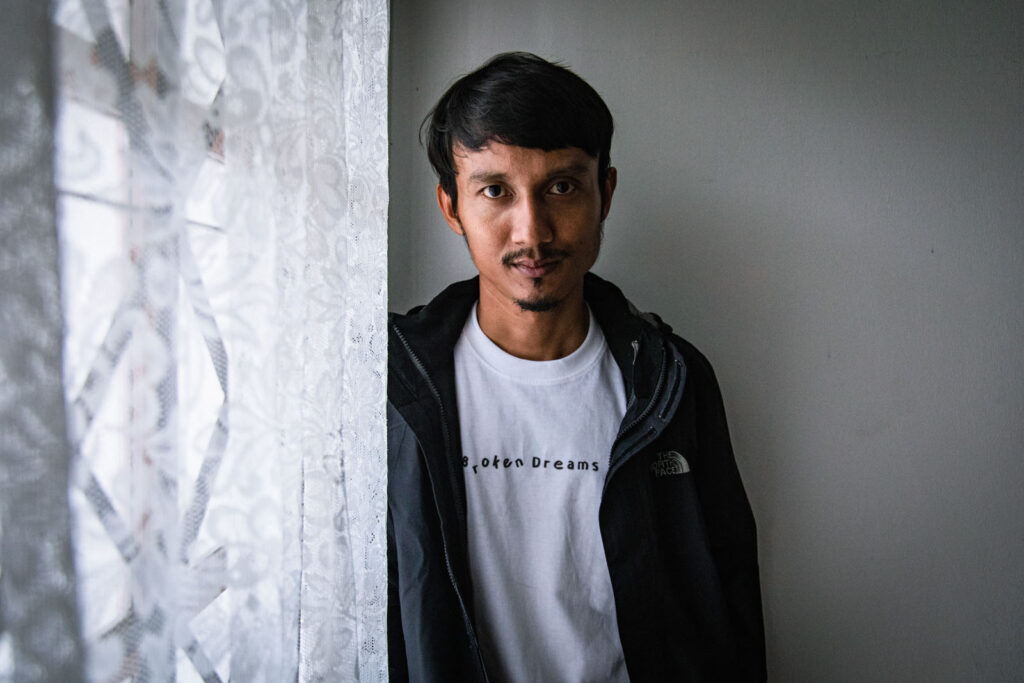
But Myanmar’s military rulers appear to be intent on crushing those seeds of change. In January, documentary filmmaker Shin Daewe was sentenced to life in prison by a court in Myanmar on charges of terrorism.
For Bo, the repression and resistance unfolding in Myanmar reminds him of the popular uprising in 1988, which was similarly suppressed by sheer brutality. Then as now, droves of activists and news workers sought shelter in Thailand and other countries, bringing with them a community of media in exile.
“In both uprisings, whether 1988 or 2021, the dictator governments did the same thing, which is attempting to silence the media, including filmmakers,” Bo concluded.
Mizzima is one of the media outlets established in the aftermath of the 1988 bloodshed, and its headquarters were later moved to Thailand out of safety concerns. One of its founders, Soe Myint, said he saw many parallels between the two historic events, but also some crucial differences.
“Back in 1988, when we founded Mizzima, we had no online platform,” Soe Myint said. “But now there are multimedia platforms which impact billions of people in and outside Myanmar every day, and they’re driven by these young people who have the professional skills and knowledge. They’re very active. So, definitely, I am more hopeful now than I was in 1988.”
With the advent of online news, Soe Myint said independent Myanmar media are allowed to carry on their work from any place around the world, beyond the reach of the junta’s suppression. Now he wants to see his fellow journalists honing their skills to serve the public and the international audience with professionalism.
“Myanmar media should try to increase their professional skills and focus on things like investigative reporting, and quality reporting,” he said. “Although there are challenges and limitations in terms of resources, they should still try their best.”
The veteran journalist also urged the community of independent media in exile to be proactive in countering propaganda and disinformation spread by the authorities, which is why younger people, who have better grasp of technology, should be given a bigger role in the field.
“I don’t have advice for them because they are going to do their job well,” Soe Myint said of the new generations of journalists. “They know what they want, and they know what they are doing. Of course, this is not an easy time to be an independent media, but we need to make every effort to continue our work.”
Out of hiding
Lifting the shadow over the Myanmar media workers in exile is one of the priorities pursued by Toe Zaw Latt from the Independent Press Council, Myanmar. To that effect, he called on the Thai government to find a workable solution for the legal statuses of the exiled journalists, in order to allow them to live and work in broad daylight.
“They should permit us to work as journalists, because people in both Thailand and Myanmar want the information,” Toe Zaw Latt said. “We are not taking any side. We’re just asking to work as journalists, that’ll be enough.”
He also suggested that Thailand would benefit from an active community of Myanmar newsmakers. With nearly two million registered Myanmar migrant workers living in the kingdom, Toe Zaw Latt said, the government cannot possibly hope to communicate or relay information to all of the workers – a gap that can be closed by Myanmar media who speak the same language with their compatriots.
However, Toe Zaw Latt said he’s not too hopeful of such development, as the Thai government would likely prefer to keep amicable ties with the Myanmar junta over supporting the dissident media in exile.
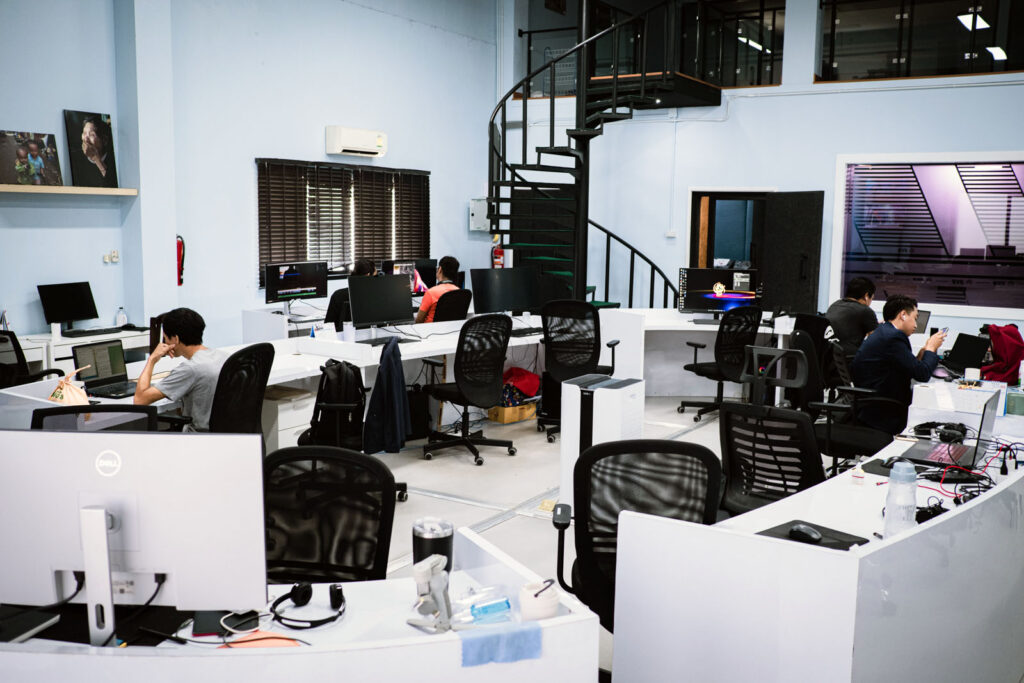
His observation was shared by Kasetsart University lecturer Lalita Hanwong, who agreed that Thailand should value humanitarian concerns over geopolitical interest and give more leeway for the exiled Myanmar media outlets to conduct their work from Thai territory.
“The Thai government should be more flexible for the sake of humanitarianism,” Lalita, one of the leading experts on Myanmar, said in an interview. “It’s a key element that will sustain Thailand’s good standing in the international community.”
The academic also noted an absence of close cooperation between Thai and Myanmar media agencies, which would have helped Thai journalists cover Myanmar in much greater depth and understanding. Instead of relying on interviews with the usual circle of Thai scholars when reporting on Myanmar, Lalita suggested, Thai media would do well to work alongside their Myanmar counterparts.
At any rate, local authorities in areas where Myanmar media in exile are operating are already aware of their existence and adopting a live-and-let-live policy, according to Mon Mon Myat, head of the DVB news agency’s office in Thailand.
“We have had a good relationship with local governments in Thailand for a long time, even before 2012,” she said, referring to the year when Myanmar embarked on a path of reforms and opening up to the outside world. “What we do is we refrain from breaking any Thai laws. We told the officials that we’re here to work as media and provide information to our people back home.”
Even then, DVB still chooses to keep a low profile like other Myanmar press outfits in Thailand, in order to avoid undue attention from the higher authorities (DVB’s office is located inside an unmarked building that any passerby would mistake for a warehouse). Mon said the officials seem to keep an eye on the journalists from a distance; their message appears to be that as long as the Myanmar media do not cause any trouble for the authorities, the authorities will leave them alone.
“I think Thai and Myanmar media should cooperate and exchange our information more closely than this. I think it’ll benefit the people on both sides of the border,” she added.
A new day, a new hope
Thu, the former teacher who now works for Dawei Watch news agency, described his daily routine as such:
“I can work all day with a cup of morning coffee. In the evening, I like to take a leisurely walk. I take the train. I sit in a cafe. When I have a day off, I go to visit my friends. But you can no longer travel in groups like in Myanmar. I can’t go down to the beach at night and eat steaks and sing songs. I can’t climb mountains anymore.”
Thu said he’s currently earning a salary of about 15,000 baht (415 USD); he spends 3,000 baht on the rent of his small room, 5,000 baht on food, and sends back 2,000 baht to his family. He’s also saving up funds to help secure his younger brother’s safe passage out of Myanmar and into Thailand to avoid the recent conscription drive by the junta.
“If I go back to Myanmar, I’d be in jail. That’s why I always tell my mom and dad to stay in good health,” Thu said. “I want to keep myself healthy, too. If something happens to me, it is not easy for me to go home and treat it…I can’t live without care like I did when I was at home.”
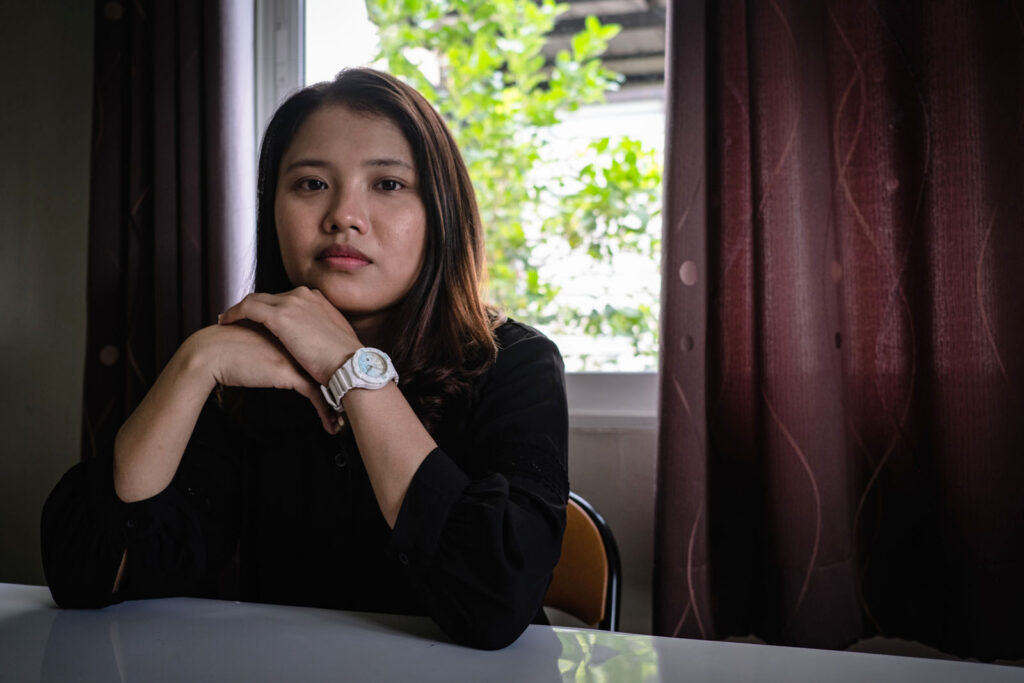
Since his escape to Thailand, Thu said he often fell ill due to the stress and anxiety caused by the difficult life in exile. At the moment, he’s trying to set his sights on securing a master’s degree and improving his English, as well as finding simple joy in everyday life.
“When I drink coffee in the morning and spend the rest of the day doing a good job, I’m already happy,” Thu said. “To live like that is my dream. Others may think, this guy is so lazy. Of course they can think like that, but I never had any dreams of wanting to be in a big position.”
As for Hsu Mon, she still cradles her dream to move the DNA newsroom back to Myanmar once again, out of her conviction that a journalist should be reporting from inside the country they’re assigned to cover, not outside. She also hopes that the existence of an independent press in Myanmar would help nurture its transition to a fuller democracy.
“Journalism is still a profession that makes me very proud of myself,” Hsu Mon said.
Back at Bo’s house, the filmmaker has turned his bedroom into a small makeshift cinema where he invited his friends for a screening of Dancing in the Dark, the short film that he directed. After the film ended, Bo told a reporter his biggest dream is to go back to Myanmar and continue his job as a director. Until then, he’ll continue his career in filmmaking from his exile in Thailand.
“I was invited to join a resettlement program in a third country, which would allow me to apply for asylum,” he said. “But I refused, because I want be close to Myanmar for the new future that will come soon.”
CREDITS
This is a repost of an entry by Nathaphob Sungkate, a feature writer from Thailand who focuses on human rights issues. The photography is by Wissarut Weerasopon, a Thai documentary and news photographer.
This feature was originally published on HaRDstories’ website in July 2024 and has been shared in this space with the appropriate permission.
You can follow HaRDstories on Instagram @hrd.stories, X @HRDstories , and Facebook @HRDstories

